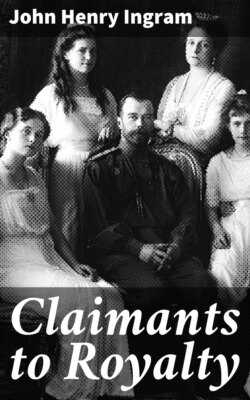Читать книгу Claimants to Royalty - John Henry Ingram - Страница 24
На сайте Литреса книга снята с продажи.
A.D. 1130.
ОглавлениеHenry the Fifth of Germany, like so many other monarchs of the middle ages, had wrested the imperial crown from the head of his unfortunate father, Henry the Fourth. This latter emperor, having been dethroned by his unnatural son, took refuge with the Bishop of Liege, in whose city he died of grief.
The fifth Henry was fully recompensed for his undutiful conduct by the continual rebellion of his subjects in different portions of the imperial dominions, by the bitter hostility of his former friend, Archbishop Albert, of Mainz, and by the unceasing persecution of the Papacy. Henry the Fifth died childless in 1125, worn out with strife, and the sceptre passed into the hands of Lothaire the Second. Five years after the Emperor's death, a Benedictine monk of the Abbey of Cluny, in Burgundy, startled his brother recluses by the assertion that he was the supposed deceased monarch, Henry the Fifth of Germany. He declared that being desirous of abdicating the crown which he had forced his unhappy parent to resign to him, he had spread the false intelligence of his own decease, and then had set out, in pilgrim garb, for the Holy Land. He narrated a pitiful tale of the indignities heaped upon his imperial head during the years of his pilgrimage; how he had narrowly escaped drowning through a man having brutally pushed him into the sea when he was on the point of embarkation; how he had been compelled by the Knights Templars, at Acre, to assist as a labourer at the construction of fortifications there; and many other equally edifying stories of his adventures. The monks appear to have believed in his identity, and some authors assert that by the express commands of Pope Innocent the Second, a firm friend of the Emperor Lothaire the Second, he was never permitted to pass beyond the precincts of the abbey.
The historian Mezerai remarks that Henry was believed to have eventually retired to Angers, and to have ended his days as a servitor to the hospital there; having, however, previous to his death, acknowledged his rank to his confessor, and been seen and recognized by his wife Maud, daughter of Henry the Second of England, who had taken another consort in the person of Geoffrey Plantagenet of Anjou.
